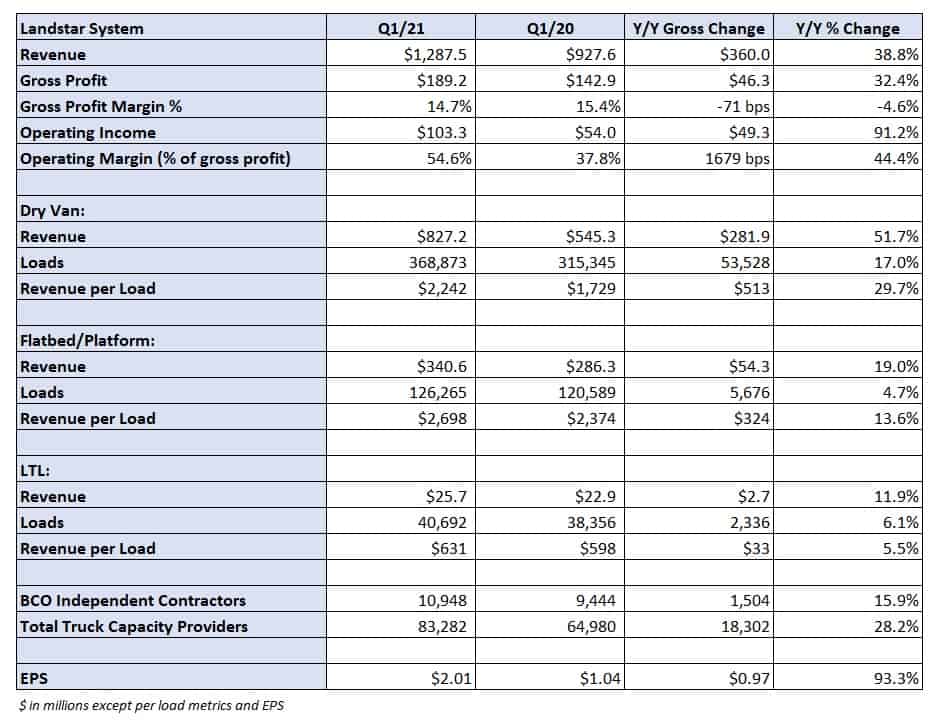Freight broker Landstar System (NASDAQ: LSTR) announced record earnings per share of $2.01 after the market closed Wednesday. The result was well ahead of the $1.63 consensus estimate and nearly double the year-ago quarter.
The Jacksonville, Florida-based company reported consolidated revenue of $1.29 billion, a 39% year-over-year increase. Gross profit climbed 32% to $189 million, “an all-time quarterly record.” The press release said the first quarter of 2020 did not provide an easy year-over-year comparison as the demand destruction caused by COVID was more of a second-quarter event.
The first quarter came in well ahead of management’s guidance, which called for revenue in a range of $1.1 billion to $1.15 billion and EPS of $1.55 to $1.65.
“Typically, truckload volumes in the first quarter of any year are softer than in the second, third and fourth quarters due to seasonality. Given the exceptional performance by Landstar in the 2021 first quarter, I believe the stage has now been set for what should be a record-setting year,” stated Jim Gattoni, president and CEO.
Gattoni, a self-proclaimed pessimist, backed off his previous call for a pullback in the spot market by the second half of 2021. On a call with analysts Thursday, he said the transition is setting up more like the 2018-19 cycle, noting that a softening in the spot market may not be seen until late in 2021. He said the change in tune is largely tied to e-commerce demand, which has not faded as he thought it would as the first half of 2021 progressed.

Management’s first-quarter guide called for loads hauled by truck to increase in a high-single-digit percentage range and revenue per load to be up by midteen percentages. Landstar easily eclipsed those estimates.
Dry van revenue was up 52% year-over-year to $828 million as loads increased 17% and revenue per load climbed 30%. Flatbed revenue was up 19% as loads increased 5% and revenue per load was up 14%.
“Consumer demand for durables, building products and e-commerce drove record quarterly van revenue, while growth in the U.S. metals and machinery sectors continued to drive improvement in unsided/platform equipment performance,” Gattoni added.
The winter storms in February pushed roughly 7,000 to 8,000 loads into March, resulting in a surge in revenue per load during the month. Revenue per load was up 31% year-over-year in March, notably higher than the 18% and 19% increases seen in January and February, respectively.
Even with a very tight capacity environment, Landstar continued to onboard new providers and agents. During the quarter, trucks provided by business capacity owners increased more than 11% year-over-year and 2.5% from the fourth quarter. Total truck capacity on the platform increased 5% sequentially and new agents contributed more than $20 million in revenue. Management said the new agent pipeline remains full.
The company’s operating margin, which Landstar defines as operating income divided by gross profit, was 54.6%, 1,680 basis points higher year-over-year and a new record.
New guidance blows past current expectations
The company isn’t using year-over-year comps for second-quarter guidance as they “are not meaningful” due to the turmoil caused by COVID-19 last year.
Normal seasonal trends usually produce a 1% sequential increase in revenue per load from the first quarter to the second. However, management expects the high-rate level seen in March to hold through the second quarter, equating to a mid-single-digit increase in yields sequentially. Management expects loads hauled by truck to also increase sequentially by a similar percentage.
The company is calling for revenue to be in a range of $1.4 billion to $1.45 billion, well ahead of current guidance of $1.2 billion and EPS in a range of $2.20 to $2.30, compared to consensus of $1.74.
Cash is building again
Landstar generated $70 million in cash flow from operations in the first quarter, ending the period with $170 million in net cash and a debt-to-capital ratio of 11%.
When asked about plans for cash deployment, Gattoni acknowledged that if trends remain on the current trajectory, the company could generate $300 million in cash flow in 2021. That number is roughly $90 million higher than the level achieved in 2020 and on par with the 2019 result. Following both periods, Landstar paid a $2-per-share special dividend.







